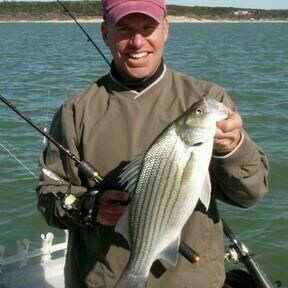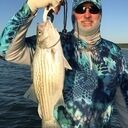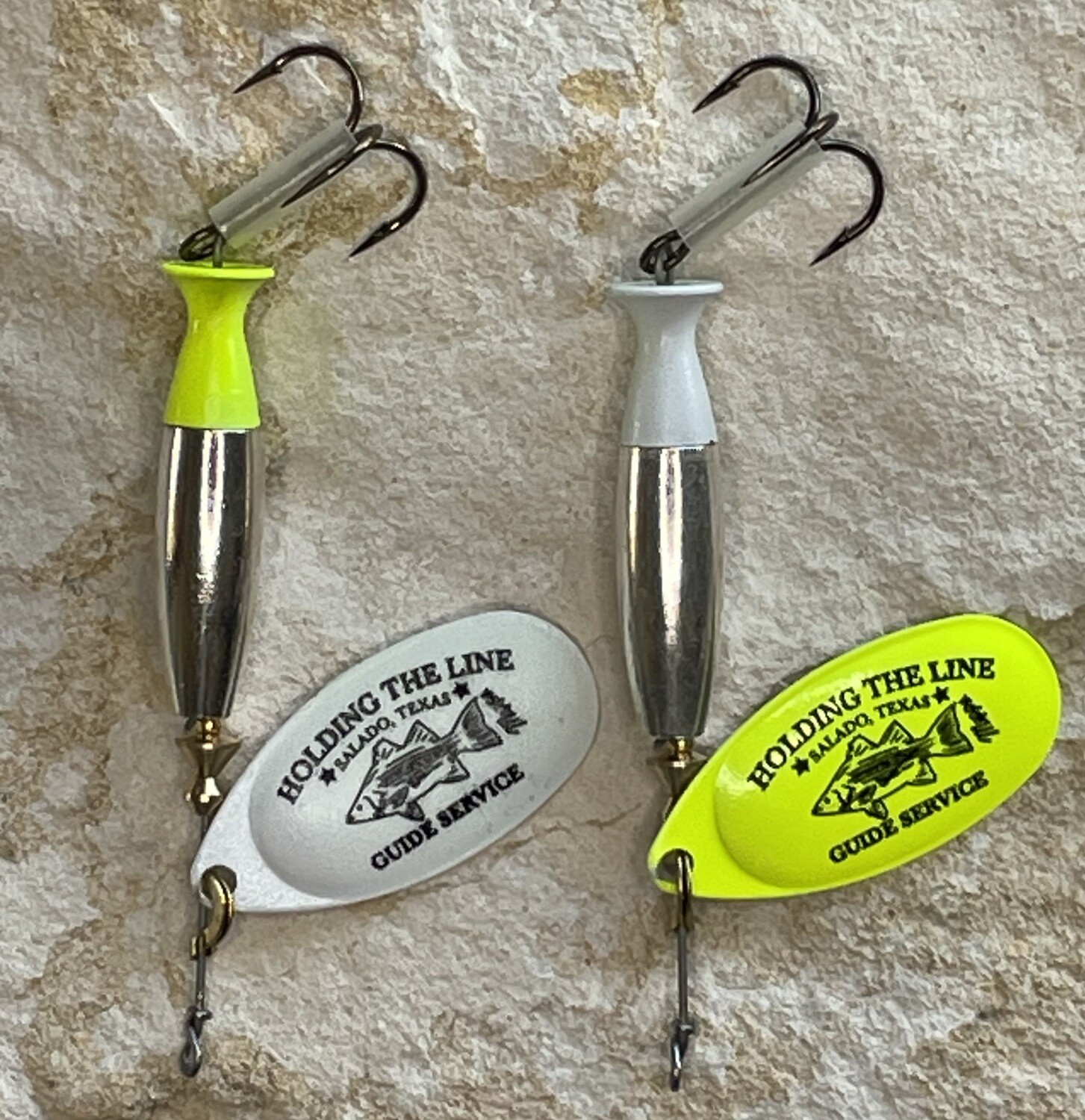Shaped by guides... Loved by fish.
This store offers anglers high-quality, effective lures used by guides day-in and day-out in pursuit of white bass and hybrid stripers.
A3. MAL HEAVY WITH COLORED BLADE (THIS IS THE MID-WEIGHT MAL LURE)
The MAL Heavy -
This is a slightly heavier version of the original MAL Lure. This is THE go-to warm water bait for white bass and hybrid stripers when fishing vertically for fish which are suspended or on bottom in deeper (25+ feet). This bait is especially effective June through October when the efficacy of slabs declines, but produces fish during the entire span of the season when the water temperature is above 58F.
Weighs approximately 7/8 oz. Measures 3.25 inches from top of blade to bend of hook (not including shaft protrusion to the line tie. This is ~1/4 oz. heavier and 3/16-inch longer than the original. It will sink from 0 to 20 feet 2 seconds faster than the original version.
You won't find this white bass/hybrid striper-specific version on the web or in stores. This is a custom lure developed through cooperation with Mepps. The hook size, hook dressing, tail color, blade size, and hook attachment method are all specifically geared toward white bass and hybrid striped bass. Cast and quickly retrieve for topwater action. Drop it to the bottom and race it up through the water column for bottom-hugging and suspended fish. With a price to match Mepps' online pricing for the non-customized version, there is no reason to look elsewhere. Guide-designed, guide-tested, guide-approved!!
- CATCHES STUBBORN SUMMERTIME FISH
- GREAT, LONG-CASTING TOPWATER BAIT
- WORK IT VERTICALLY FOR SUSPENDED FISH
- WORK IT BACK IN A "SAWTOOTH PATTERN" HORIZONTALLY FOR BOTTOM-HUGGING FISH IN SHALLOW/MID-DEPTH WATER
TECHNICAL DATA:
My favorite pairing for this incredibly effective bait is to use Sufix 832 Advanced Superline (a braid) in 20 pound test, attached to a clear, 35-pound test Aquateko Invisaswivel, which is then attached to a ~24-inch fluorocarbon leader in 25-pound test. A swivel is necessary to eliminate line twist, and the Invisaswivel is easier on your rod’s tip than metallic swivels.
I use a Berkley Inshore BSINS701ML, 7’, 1-piece spinning rod with a Pflueger President PRESP25 spinning reel (5.2:1 gear ratio).
This bait excels in three applications: 1) “smoking” for bottom-hugging and suspended fish, 2) lift-dropping, and 3) sight casting to topwater fish.In both cases a fast retrieve is best.For topwater fish, keeping the rod tip low to the water and reeling just fast enough to keep the bait from skipping out of the water is the key to success.
Lift-dropping involves retrieving the MAL Lure back to the boat horizontally after making a long cast and allowing the lure to sink to the bottom. The lift-dropping action resembles a saw-tooth pattern. This tactic can be used from a Spot-Lock position, or casting downwind while drifting. Do not cast upwind while drifting.
After casting, leave the spinning reel's bail open so the lure sinks quickly and straight down. Once the lure settles on the bottom, close the bail by hand (this will prevent problematic loops from forming in braided line). Next, turn the handle to take up any slack and, once the line is taut, reel 6-8 cranks, thus bringing the bait off the bottom at an angle, headed back toward the boat.
Once those 6-8 handle cranks are done, manually open the bail again, allowing the lure to return to the bottom. Repeat the cranking and bail opening process until the lure is nearly vertical beneath the boat.
Smoking involves allowing the lure to fall to the bottom and very quickly reeling it up at least half-way off the bottom. The strikes will come as you are reeling it up.A hard hookset is unnecessary, in fact, it is counter-productive. A single, quick handle turn is helpful in getting the blade starting to spin. Once the blade begins to spin, the bend in your rod will increase sharply, so there will be no mistaking that this has happened successfully.
I like to use the MAL vertically in conjunction with well-tuned colored sonar and/or Garmin LiveScope so I can see fish response to the baits and know when to keep reeling (as the lure is being chased), or when to allow the lure to drop back to bottom (if the fish are less enthusiastic).
In both tactics, starting the retrieve with a single, hard, fast turn of the reel’s handle is essential to getting the spinner’s blade turning.
THE HISTORY OF THE ORIGINAL MAL LURE:
Available only through Holding the Line Guide Service, National Athletics Supply (Belton, TX), and Wooded Acres Tackle (Richland-Chambers Reservoir, TX)
My love affair with white bass and hybrid stripers began during my senior year in high school. My dad, a Vietnam-era Army officer, got orders to Fort McPherson, near Atlanta, Georgia, at the end of my junior year of high school in Liverpool, New York.
From our home in Jonesboro, Georgia, I trailered our 14-foot aluminum V-hull with a 9.9 horsepower Evinrude outboard down I-85 to West Point Lake, an impoundment on the Chattahoochee River, right on the Georgia-Alabama border, near LaGrange, Georgia.
One evening, while fishing near a shoal (that’s Georgian for hump), a mixed school of white bass and hybrid striped bass forced a school of shad to the surface and began feeding on them violently. The fish were aggressive, the shad were jumping out of the water trying to escape, my topwater lure was repeatedly annihilated, and, when it was all over, one of the most memorable fishing moments of my life was seared into my brain.
Since that night on the Chattahoochee, I have pursued white bass, hybrid stripers, and striped bass every chance I get.
In 2006, I began guiding for white bass and hybrid striped bass professionally, after pursuing them on Lake Belton and Stillhouse Hollow Reservoir in Central Texas for the previous 14 years.
Take a look in any tackle catalog and you will quickly see there are not a lot of lures, nor tackle, designed specifically for whites and hybrid. Many of the lures I rely on day-in and day-out I either make myself or modify from commercially available versions.
Barring flooding, I believe June and July are the two most difficult months of fishing for whites and hybrids all year. Downrigging in the summer is always productive in and of itself, but, some folks don’t care for trolling. Downrigging allows me to effectively cover water while watching my sonar like a hawk for signs of congregated whites and hybrid, either suspended or on bottom, to stop and fish for.
Until 2018, I struggled with an effective lure to tempt tightly grouped whites and hybrids on the occasions I could find them while downrigging. It was frustrating to look and look for fish, only to find them and then not be able to get them to bite well.
In 2019, I had a breakthrough. On a whim, I decided to hand-make my own tailspinners. I knew tailspinners, like the Mann's Little George, were effective, but, the commercially available versions all had significant drawbacks. My design addressed and improved on these flaws, and the baits worked. However, they were prone to tangling just enough to be annoying, and, due to their compact size and heavy weight, a lot of my rookie clients lost fish right at the boat as they left fish dangling over the water instead of swinging them over the side of the boat.
I never marketed my tailspinners, as I just wasn’t confident that the average angler could make them work to their full potential.
If nothing else, I knew the spinning action of the tailspinner attracted fish. I continued experimenting in 2018 and 2019 with in-line spinners. Again, I knew from previous experience that in-line spinners had their drawbacks, and I developed my own versions to combat those problems, chief of which was a slow sink rate. Using tungsten, I worked around the sink rate issue.
About the time I got the spinners where I wanted them, fall weather came in during 2019 and I was back onto a hot slab bite with my Hazy Eye Slabs equipped with stinger hooks. The spinners were relegated to the back shelf.
As the end of May rolled around in 2020, and the live shad bite for hybrid had about run its course, I once again began experimenting with my spinners. At this same time, a friend and fellow Lake Belton multi-species angler, Bill Pasko, shared with me about his successes with spinners. He was using a large Mepps Aglia spinner with great success.
One day, as we compared notes at the Westcliff boat ramp on Lake Belton, he showed me a modified version of the model of Mepps Aglia he was using, complete with a barbless hook for quick, clean releases.
That day I got on the phone with both Laurie Powell and Darryl Laurent of Mepps and described my desire to obtain small, but heavy, in-line spinners from them for the purpose of targeting white bass and hybrid striped bass.
After some trial and error, and some willingness to be flexible on Mepps’ behalf, they worked with me to produce the white bass/hybrid-specific model of in-line spinner now found only on my website, and named the Maindelle’s All-Purpose Lure (MAL lure, for short).
I have now fished with multiple iterations and versions of this lure and now feel the version I am offering is the very best combination of all of the colors and components out there. Unlike my reservations with my tailspinners, I have no reservations about putting this in the hands of the average angler, and knowing his or her results will improve, and especially so in the difficult summer months from late May into late September.
This heavily customized spinner uses components to effect a fast sink rate, with colors, blade sizes, hook sizes, hook dressings, and hook attachments which are specifically geared toward white bass and hybrid striped bass, all at a price equivalent to that on Mepps’ online catalog for their models NOT specifically designed for whites and hybrid.
I have tried to give anglers every reason to try this lure developed specifically for white bass and hybrid stripers, including keeping pricing in check.
My favorite pairing for this incredibly effective bait is to use Sufix 832 Advanced Superline (a braid) in 20 pound test, attached to a clear, 35-pound test Aquateko Invisaswivel, which is then attached to a ~24-inch fluorocarbon leader in 25-pound test. A swivel is necessary to eliminate line twist, and the Invisaswivel is easier on your rod’s tip than metallic swivels.
I use a Berkley Inshore BSINS701ML, 7’, 1-piece spinning rod with a Pflueger President PRESP25 spinning reel (5.2:1 gear ratio).
This bait excels in two applications: 1) “smoking” for bottom-hugging and suspended fish, and 2) sight casting to topwater fish. In both cases a fast retrieve is best. For topwater fish, keeping the rod tip low to the water and reeling just fast enough to keep the bait from skipping out of the water is the key to success.
Smoking involves allowing the lure to fall to the bottom and very quickly reeling it up at least half-way off the bottom. I like to use the MAL vertically in conjunction with well-tuned colored sonar and/or Garmin LiveScope so I can see fish response to the baits and know when to keep reeling (as the lure is being chased), or when to allow the lure to drop back to bottom (if the fish are less enthusiastic).
In both tactics, starting the retrieve with a single, hard, fast turn of the reel’s handle is essential to getting the spinner’s blade turning.
About Us

Bob Maindelle
store owner
Who I Am
My name is Bob Maindelle. I was born into a fishing family in 1969 while my dad was serving in Vietnam. My earliest childhood memories revolve around angling. Pop Pop Hamilton was a commercial fisherman on the Mississippi, mom and dad went fishing on Clarks Hill Reservoir near Augusta, Georgia, on cheap dates as newlyweds, and Uncle Glenn ran a saltwater charter boat out of Shark River, NJ. I'm now happily married, live in Salado, Texas, right at the eastern edge of the Texas Hill Country, and am carrying on the family tradition. I have fished all over our nation in fresh waters and salt, and with all manner of gear and tackle. In 1991, I graduated from West Point (U.S. Military Academy) with a Bachelor of Science degree in environmental engineering, and spent 8 years with the U.S. Army Corps of Engineers, followed by 9 years in industry as an environmental engineer. I retired in 2016 from full-time ministry as the Small Groups Pastor at a large church in central Texas. My business experience from my "previous life" and my flexible schedule allow me to operate "Holding The Line Guide Service" out of my home on the lakes of this region. I am physically fit, extremely well-organized, very methodical, self-disciplined and detail-oriented. I enjoy introducing beginners to the sport. I enjoy coaching those with a little experience. I enjoy fishing with great fishermen and picking up on tips and techniques from all over the country. I am not so prideful to think that I cannot still learn much from other further down the path than I.
Why I Fish
The pursuit of fish is, to me, an incomparable, lifelong challenge that tests the mind, the body, and even the will. The timeless variables of weather, wind, forage location, light, temperature and pressure prevent any one day's pursuit from being like the chase of any other day. Every sunrise holds new promise, every storm front brings change, every season nudges fish movements, and though the cycle has repeated since the beginning of time, I believe the code will never be fully deciphered. But there are some who understand parts of the code. I am one. And that understanding breeds a desire to preserve and to protect that same Creation that is pursued.
"Absolutely the consummate professional! He actually should start a school for want-to-be guides! I've been on at least 100 guided trips, NEVER had a guide in any field do the job Bob does!
D. Stone

